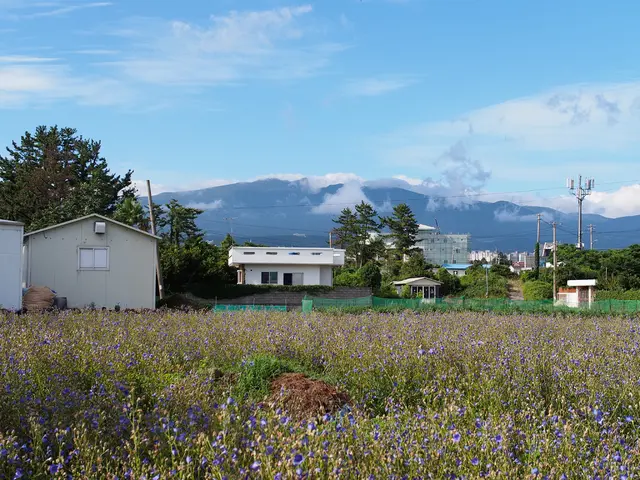Fostering Global Unity: Kazakhstan's Crucial Contribution to International Collaboration
In the face of mounting global challenges like political instability, climate change, and economic volatility, it's clear that international cooperation is more vital than ever. And in this unpredictable landscape, middle powers like Kazakhstan are stepping up to fill the gap once occupied by the world's superpowers. Set to host the Astana International Forum 2025, Kazakhstan is poised to lead discussions around foreign policy, energy, and finance, with over 5,000 delegates from around the world anticipated to attend from May 29 to 30 in the country's capital. Under the tagline "Connecting Minds, Shaping the Future," this event aims to encourage cross-border dialogue and foster joint solutions to the urgency of today's global issues.
Photo credit: our platform
Situated at the heart of Eurasia, bordered by Russia, China, the Kyrgyz Republic, Uzbekistan, Turkmenistan, and the Caspian Sea, Kazakhstan finds itself in a pivotal position, linking major geopolitical interests and transcontinental trade dynamics. With a foreign policy strategy prioritizing partnerships, Kazakhstan is making strides in enhancing global trade, strengthening economic relations, and fostering sustainable growth for both domestic and regional economies. According to Roman Vassilenko, Kazakhstan's Deputy Foreign Minister, "By leveraging our geographic and strategic position, Kazakhstan is amplifying our contribution to promoting trade, encouraging economic relationships, and nurturing sustainable growth across the region."
The nation's active involvement in vital trade corridors, such as the Belt and Road Initiative (BRI) and the Trans-Caspian International Transport Route (TITR), also known as the Middle Corridor, serves to demonstrate its role in facilitating trade and diplomatic exchanges between the East and West. In 2024, the volume of goods transported through the Middle Corridor surged by 62% to reach 4.5 million tons, with experts projecting it to reach an annual throughput capacity of 10 million tons by 2027.
Over 80% of goods from China and Central Asia heading for land-based transportation to Europe pass through Kazakhstan, demonstrating its status as a critical transit hub in Eurasian trade. With ambitions to further contribute to regional and global development, Kazakhstan aims to bridge the divide between continents, cultures, and nations.
The nation has proactively extended its international reach through multinational initiatives like the Central Asia Plus Framework, which aims to solidify regional collaboration. Vassilenko admits that "the narrative surrounding Central Asia is shifting towards a more cooperative region," and adds that common challenges, such as battling global warming and ensuring sustainable economic growth, are helping to unite the region.
Kazakhstan's commitment to diverse partnerships and participation in global trade and economic forums emphasizes its dedication to resilient economic development by supporting the growth of non-oil industries and funding infrastructure development and digital innovation. In 2024, this strategy contributed to a 4.7% economic growth, primarily driven by developments in non-oil sectors. In the past year, the nation has also chaired several major international organizations, including the Shanghai Cooperation Organisation, the Collective Security Treaty Organization, the Conference on Interaction and Confidence-Building Measures in Asia, the Organization of Turkic States, and the Islamic Organisation for Food Security. This year, Kazakhstan continues to lead the International Fund for Saving the Aral Sea.
As an advocate for the Great Gain for All principle, Kazakhstan has taken a unified approach to confronting political, social, and environmental challenges. According to Vassilenko, this perspective reflects their belief that cooperation, instead of competition, should drive global relations.
In line with the United Nations' commitment to global security and stability, Kazakhstan has actively supported UN peacekeeping missions, deploying around 650 peacekeepers. Since independence, the country has allocated $600 million for humanitarian and development aid and provided a neutral platform for facilitating peaceful settlements to regional conflicts, such as the Astana Process on Syria since 2017 and the talks between Azerbaijan and Armenia in 2020.
Beyond its diplomatic endeavors, Kazakhstan plays a vital role in stabilizing global energy markets. Kazakhstan supplies 43% of the world's uranium needed for nuclear power plants and produces more than half of the 34 critical raw materials of high importance to the EU. Furthermore, the country is investing in green hydrogen production, as well as wind and solar energy, striving to become a leader in renewable energy exports. By investing in energy infrastructure and adopting policies that strengthen energy export, Kazakhstan is positioning itself as a reliable long-term partner for the EU in the energy sector.
Through its strategic initiatives and diplomatic engagements, Kazakhstan continues to shape the world stage, advocating for peace and stability to reflect the needs of the multipolar reality of the 21st century.
The article was initially published in CNN International as part of the Astana International Forum's 2025 brand.
Points to Note:
- Kazakhstan is a significant middle power facilitating international cooperation, trade, and diplomatic relationships, particularly as a regional connector.
- The Astana International Forum 2025 is a platform for discussions on regional integration, economic development, and diplomatic strategies.
- Kazakhstan's strategic location, multi-vector foreign policy, and participation in vital trade corridors position the country as a critical transit hub in Eurasian trade.
- Kazakhstan's focus on partnerships, economic diversification, and development of non-oil industries aims to foster sustainable growth and resilient economic development.
- Kazakhstan's commitment to the Great Gain for All principle underscores its preference for cooperation over competition in global relations.
- Kazakhstan plays an influential role in global energy markets, as a source of uranium, critical raw materials, and a promoter of renewable energy.
- Kazakhstan's active support of UN peacekeeping missions, humanitarian aid, and peace talks demonstrates its dedication to maintaining peace, security, and stability on the world stage.
- Recognizing the importance of international cooperation in tackling global challenges such as political instability, climate change, and economic volatility, Kazakhstan will prioritize connecting the renewable-energy industry with finance during the Astana International Forum 2025 to foster sustainable growth and strengthen economic relations.
- In 2025, as Kazakhstan hosts the Astana International Forum, the nation is expected to leverage its position as a regional connector to encourage multinational dialogue on foreign policy, energy, and finance, aiming to address the urgency of current global issues.
- The energy sector continues to be a key focus for Kazakhstan, with the nation supplying 43% of the world's uranium for nuclear power plants, making significant investments in green hydrogen production, and working towards becoming a leader in renewable energy exports.
- By investing in energy infrastructure, strengthening energy export policies, and committing to the Great Gain for All principle, Kazakhstan positions itself as a reliable long-term partner for the EU in the energy sector, emphasizing the importance of cooperation in shaping the 21st-century global landscape.








